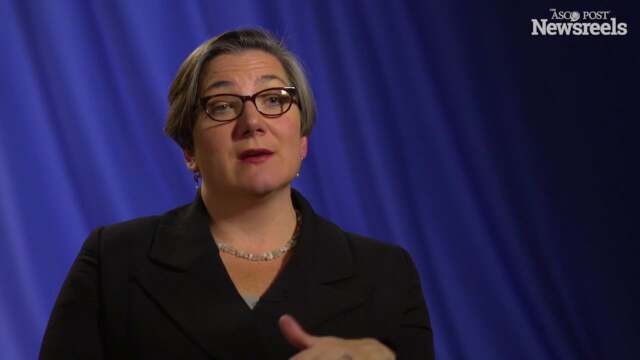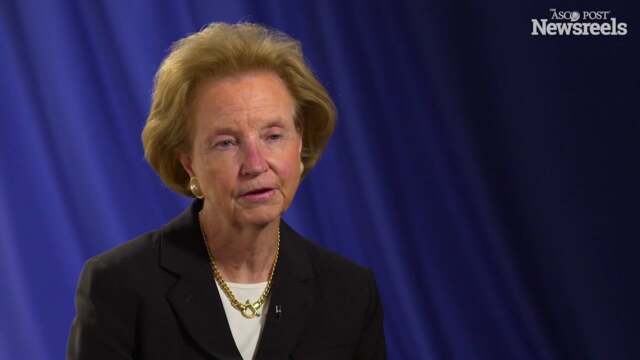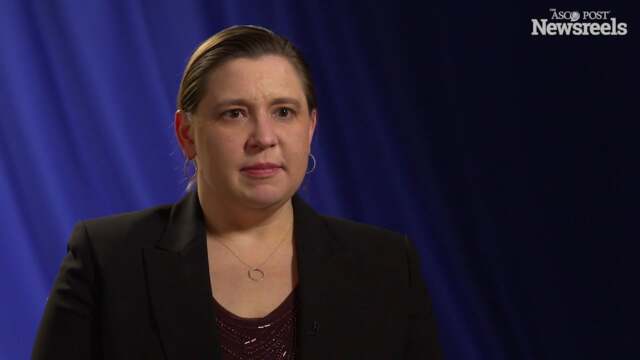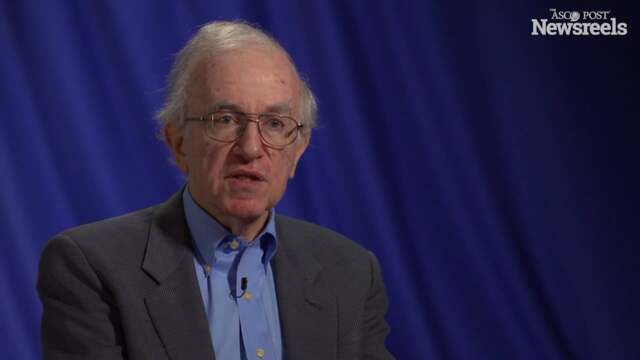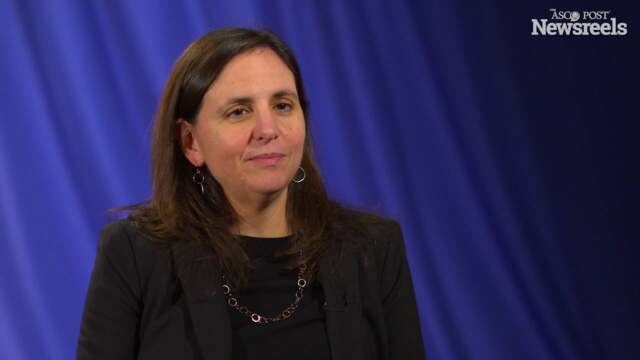Daniel A. Vorobiof, MD, and Bernardo Leon Rapoport, MD, on NK-1 Inhibitors for CINV: Potentially Practice-Changing Data
Daniel A. Vorobiof, MD, of the Sandton Oncology Centre, and Bernardo Leon Rapoport, MD, of The Medical Oncology Centre of Rosebank, discuss the first study to evaluate the efficacy and safety of a single dose of intravenous fosaprepitant. The use of this NK1 inhibitor and another (rolapitant) in a second study discussed may change the management of chemotherapy-induced nausea and vomiting and improve quality of life for patients (Abstracts 9629 and 9615).
Thomas W. LeBlanc, MD, and Eric Roeland, MD, FAAHPM, on Palliative Care for Patients With Hematologic Malignancies
Thomas W. LeBlanc, MD, of Duke University Medical Center, and Eric Roeland, MD, FAAHPM, of the University of California, San Diego Moores Cancer Center, discuss the use of palliative and hospice care for patients with solid tumors vs hematologic cancers and clinicians’ attitudes (Abstracts e20554 and 9524).
Areej El-Jawahri, MD, and Eric Roeland, MD, FAAHPM, on Quality of Life and Satisfaction With Care
Eric Roeland, MD, FAAHPM, of the University of California, San Diego Moores Cancer Center, and Areej El-Jawahri, MD, of Massachusetts General Hospital, discuss two important studies on early palliative care and the use of anamorelin in advanced NSCLC with cachexia.
Charles F. von Gunten, MD, PhD, Discusses Anamorelin and Olanzapine for Palliative Care
Charles F. von Gunten, MD, PhD, of OhioHealth Kobacker House discusses the ROMANA 1 and 2 trials on cachexia in NSCLC and a study on olanzapine vs fosaprepitant for the prevention of nausea and vomiting (Abstracts 9500 and 9502).
Irene Higginson, MD, on Palliative and End-of-Life Care: An International Perspective
Irene Higginson, MD, of Cicely Saunders International, discusses the goals of psychosocial palliative care for patients around the world with advanced cancer.
Wendy Lichtenthal, PhD, and David Kissane, MD, on Models of Family-Centered Care During Palliative Care and Bereavement
Wendy Lichtenthal, PhD, of Memorial Sloan Kettering Cancer Center, and David Kissane, MD, of Monash University, discuss the importance of and challenges with attending to the whole family during palliative care.
Eduardo Bruera, MD, on Cachexia Assessment and Management State of the Art
Eduardo Bruera, MD, of The University of Texas MD Anderson Cancer Center, discusses exciting developments in the assessment and management of cachexia, as well as a number of emerging pharmacologic and nonpharmacologic interventions (Abstract 67).
Lorenzo Cohen, MD, on Acupuncture and Other Nondrug Pain Management Techniques
Lorenzo Cohen, MD, of The University of Texas MD Anderson Cancer Center, discusses nonpharmacologic approaches to symptom control. Techniques such as acupuncture for managing pain and chemotherapy-induced nausea and vomiting, or yoga and meditation to help improve quality of life, can be safely integrated into oncology care.
Judith Vick, MD Candidate, and Rachelle E. Bernacki, MD, on A New Clinical Tool: The “Surprise Question”
Judith Vick, MD Candidate, of Johns Hopkins University School of Medicine, and Rachelle E. Bernacki, MD, of Dana-Farber Cancer Institute, discuss a tool that could help clinicians identify seriously ill patients who would benefit from conversations about their goals and values (Abstract 8).
Diane Portman, MD, on Integrating Palliative Care in Cancer Treatment
Diane Portman, MD, of Moffitt Cancer Center, discusses clinical pathways that embed palliative care along the spectrum of care for a variety of cancer disease states.
Anthony L. Back, MD, on Improving Communication Between Patient and Provider
Anthony L. Back, MD, of Seattle Cancer Care Alliance, summarizes a general session on best practices and novel tools for enhancing communication between patients and oncology providers (Abstracts 8,9, 39).
Vicki Jackson, MD, MPH, on Effective Care Integration and the Comanagement Model
Vicki Jackson, MD, MPH, of Massachusetts General Hospital, summarizes her keynote lecture (plenary talk).
Lawrence H. Einhorn, MD, on CINV Clinical Trial Results: The Alliance A221301 Study
Lawrence H. Einhorn, MD, of Indiana University Simon Cancer Center, discusses the encouraging study findings on olanzapine for prevention of chemotherapy-induced nausea and vomiting in patients receiving highly emetogenic chemotherapy (Abstract 176).
Kathleen Foley, MD, on Palliative Care in Low-Resource Settings
Kathleen Foley, MD, of Memorial Sloan Kettering Cancer Center, discusses the challenges of integrating palliative care in areas without sufficient resources or health-care infrastructure.
Kathleen Elizabeth Bickel, MD, MPhil, on Defining High-Quality Palliative Care in Oncology Practice
Kathleen Elizabeth Bickel, MD, MPhil, of the White River Junction VA Medical Center, discusses the ASCO/AAHPM Guidance Statement, which will help oncology providers enhance their delivery of palliative care (Abstract 108).
Lawrence H. Einhorn, MD, on Palliative Radiation for Advanced Cancer and Symptomatic Bone Metastases
Lawrence H. Einhorn, MD, of Indiana University Simon Cancer Center, discusses the ways in which a dedicated palliative radiation consult service can improve the quality of palliative cancer care (Abstract 110).
Ralph J. Hauke, MD: Toward Improved Quality of Life
Ralph J. Hauke, MD, of Nebraska Cancer Specialists, discusses the application of scientific analysis and research to palliative care issues, which will allow better prognostication, implementation of measures, and improved quality of life.
Betty Ferrell, PhD, RN, on Depression and Cancer Care
Betty Ferrell, PhD, RN, of City of Hope, discusses two papers that look at an important issue from different perspectives: depression and anxiety among family caregivers of patients with advanced cancer, and the link between oncologists’ dispositional affect and depressive symptoms in their patients with metastatic cancer (Abstracts 224, 214).
Jennifer S. Temel, MD's Expert Perspective: Palliative Care in 2015
As Steering Committee Chair of this year’s symposium, Jennifer S. Temel, MD, of Massachusetts General Hospital, discusses the goals and highlights of the meeting.
Amelie Harle, MD, on Aprepitant for Cough in Lung Cancer
Amelie Harle, MD, of the Christie NHS Foundation Trust, discusses a clinical trial––the first of its kind—designed to assess the efficacy of an antitussive in patients with lung cancer (Abstract 2).
Eric Roeland, MD: Toward Better Treatment for Cachexia
Given the challenges of recruiting patients for palliative care studies, Eric Roeland, MD, of the University of California, San Diego, discusses a way to increase the participation of those with cachexia, with the hope of improving treatment (Abstract 67).
Charles L. Loprinzi, MD, on Olanzapine for Prevention of CINV
Charles L. Loprinzi, MD, of the Mayo Clinic, discusses olanzapine for the prevention of chemotherapy-induced nausea and vomiting in patients receiving highly emetogenic chemotherapy (Abstract 176).
How Effective Communication Can Improve Patient Care—and Reduce Physician Burnout
Surveys conducted between 1950 and 1970 show that most physicians considered it inhumane to give patients with a poor cancer prognosis the bad news.1,2 Since then, it has been well established that open communication between physician and patient is an essential part of effective cancer care and...
Study Confirms Benefit of Triplet vs Doublet in Newly Diagnosed Multiple Myeloma
Triplets should be the standard of care in most newly diagnosed multiple myeloma patients, according to a study that validated a practice that has become common in the United States, though not necessarily elsewhere. The use of three drugs led to significant reductions in disease progression and...
One in Seven Colorectal Cancer Patients Diagnosed Before Recommended Screening Age
Nearly 15% of patients diagnosed with colorectal cancer were younger than 50, the age at which screening recommendations begin. The study by researchers at the University of Michigan Comprehensive Cancer Center also found that younger patients were more likely to have advanced disease. The authors ...
2016 GI Symposium: Irinotecan Liposome Injection in Metastatic Pancreatic Cancer: Updated Results of the Phase III NAPOLI-1 Study
Merrimack Pharmaceuticals, Inc, announced that an updated overall survival analysis of the phase III NAPOLI-1 study of irinotecan liposome injection (Onivyde) in combination with fluorouracil (5-FU) and leucovorin achieved a substantial improvement in 12-month overall survival compared to 5-FU and...
2016 GI Symposium: New Regimen for Locally Advanced Rectal Cancer as Effective as, but Less Toxic Than, Chemoradiation
Findings from a Polish phase III study point to an additional treatment option for patients with advanced rectal cancer. Patients who received short-course (5-day) radiation followed by consolidation chemotherapy before surgery achieved outcomes similar to those of patients treated with...
New Target Identified for Reducing Metastasis
A protein that is constantly expressed by cancer cells and quiescent in healthy cells appears to be a solid target for reducing cancer's ability to spread, scientists reported. The WASF3 protein enables cancer cell invasion, and by interrupting its relationship with another protein, CYFIP1, which...
Palliative Care Initiated in the Emergency Department Associated With Improved Quality of Life
A palliative care consultation initiated in the emergency department for patients with advanced cancer was associated with improved quality of life and did not seem to shorten survival, according to an article published by Grudzen et al in JAMA Oncology. Visits to the emergency department are...
Blood Test That Monitors ctDNA Better Than the Standard in Tracking Metastatic Melanoma
Physicians treating patients with metastatic melanoma may soon have a superior tool in their efforts to closely track the disease. A new study shows that a blood test that monitors blood levels of DNA fragments from dead cancer cells does a better job than the current standard test at tracking the...
Palliative Care, Quality of Life, and Cost
More than half of our nation’s patients with cancer are Medicare beneficiaries, making the entitlement program ground zero in the heated debate on health-care spending. Total Medicare expenditures attributable to beneficiaries in their last year of life runs upward of 30%; this statistic serves as...
A Conversation with Judith Redwing Keyssar, RN
The number of patients seeking hospice and palliative care has grown significantly since 1974, when the NCI funded the first hospice facility in Branford, Connecticut. Nevertheless, according to the National Center for Health Statistics, 85% of Americans still die in hospitals or nursing homes....
GU Symposium 2016: Even After Antiandrogen Therapy, Docetaxel Remains Useful in Prostate Cancer
A study presented at the 2016 Genitourinary Cancers Symposium showed that 40% of patients with metastatic castration-resistant prostate cancer treated with docetaxel following abiraterone (Zytiga) had at least a 50% reduction in prostate-specific antigen (PSA), demonstrating the activity of...
Italian Study Shows Low-Dose Morphine Better Than Weak Opioids in Relieving Moderate Cancer Pain
In an Italian trial reported in the Journal of Clinical Oncology, Bandieri et al found that low-dose morphine provided better and more rapid pain relief than weak opioids in patients with moderate cancer pain. Study Details In the open-label 28-day trial, 240 adults with moderate cancer pain from ...
Thomas J. Smith, MD, Appointed Director of Palliative Care, Johns Hopkins Medicine and Sidney Kimmel Comprehensive Cancer Center
Thomas J. Smith, MD, has joined Johns Hopkins as the Director of Palliative Care for Johns Hopkins Medicine and the Hopkins’ Sidney Kimmel Comprehensive Cancer Center. Before joining Johns Hopkins, Dr. Smith served as the Medical Director of the Thomas Palliative Care Program and the Co-director of ...
Summary of ASCO Provisional Clinical Opinion on Palliative Care
The ASCO provisional clinical opinion on palliative care recently published1 was based largely on data from seven published randomized controlled trials, including a phase III lung cancer trial by Temel and colleagues, which was the trigger for the new recommendations.2 The trial’s principal...
ASCO Releases Palliative Care Provisional Clinical Opinion
ASCO has released a provisional clinical opinion (PCO) addressing the integration of palliative care services into standard oncology care.1 The ASCO Post recently spoke with one of the PCO’s lead authors, Thomas J. Smith, MD, Director of Palliative Care for Johns Hopkins Medicine and the Johns...
Untreated Cancer Pain Remains a Significant Global Problem
“Physicians are afraid of morphine … Doctors [in Kenya] are so used to patients dying in pain … they think that this is how you must die. They are suspicious if you don’t die this way — [and feel] that you died prematurely.” —Human Rights Watch interview with Dr. John Weru of Nairobi Hospice,...
The Semantics of Palliative Care
The interview with Thomas J. Smith, MD (The ASCO Post, April 15, 2012), the lead author of the ASCO Palliative Care Provisional Clinical Opinion, was timely. However, it left many clinical terms and issues unclear. A significant percentage of modern medicine, including cancer care, is palliative....
Pain Remains Prevalent and Often Inadequately Treated among Cancer Outpatients
“Pain is as prevalent in ambulatory oncology patients with common solid tumors as it was more than 20 years ago, despite the fact that opioid prescribing in the United States has increased more than 10-fold since 1990,” according to results of a study among 3,023 ambulatory patients with cancer...
Studies Report Findings in Patient-centered Care
New studies highlighting findings that will lead to improvements in the patient experience and identifying potential risks for development of cancers in the future were reported at a press briefing held during the 2012 ASCO Annual Meeting in Chicago. “In this era of sophisticated research advances, ...
Antipsychotic Effectively Controls Chemotherapy-induced Breakthrough Nausea and Vomiting
Olanzapine (Zyprexa), an FDA-approved antipsychotic, effectively controlled chemotherapy-induced nausea and vomiting (CINV) in patients who failed to respond to guideline-recommended antiemetic therapy in a phase III trial presented at the ASCO Annual Meeting.1 “This is the first randomized trial...
Early Access to Palliative/Supportive Care vs Usual Care Improves Pain Management
Many cancer patients remain undertreated for pain despite availability of guidelines and educational efforts to improve pain treatment. In a recent Annals of Oncology article, Bandieri and colleagues from the Italian Epidemiologia Clinico-Assistenziale del Dolore in Ospedale (ECAD-O) group report a ...
Supportive Care Research Runs the Gamut from Genetic Markers of Treatment Side Effects to Neuropathic Pain Therapies
Attendees from around the world gathered for the Multinational Association for Supportive Care in Cancer/International Society of Oral Oncology (MASCC/ISOO) International Symposium on Supportive Care in Cancer, held June 28–30 in New York. Below are highlights from the meeting, representing...
Dying Patients with Cancer Who Avoid Aggressive Care but Stay Connected with an Oncologist Have Better Quality of Life
Dying patients with cancer who avoided hospitalizations and life-prolonging measures, who worried less, prayed or meditated, were visited by a pastor, and maintained a therapeutic alliance with their oncologist had the highest quality of life at the end of life, according to a study recently...
Important Messages about Palliative Care and Hospice at the Heart of New End-of-life Memoir
The illness memoir’s appeal proves enduring in a very crowded genre, perhaps because illness is a tie that binds us all. As Susan Sontag wrote in her classic work, Illness as a Metaphor, “Illness is the night-side of life, a more onerous citizenship. Everyone who is born holds dual citizenship, in...
Study Shows Little Association of Multidisciplinary Tumor Boards with Measures of Care
A survey of Veterans Affairs (VA) medical centers recently reported by Nancy L. Keating, MD, MPH, and colleagues at Harvard Medical School in the Journal of the National Cancer Institute showed that the presence of multidisciplinary tumor boards had little association with rates of recommended...
Patients Receiving Palliative Radiation Therapy for Metastatic Non–Small Cell Lung Cancer May Be Overtreated
Many patients receiving palliative radiation therapy to the bone or chest for metastatic non–small cell lung cancer (NSCLC) may be receiving a greater number of treatments and higher doses than are supported by current evidence, according to a Cancer Care and Outcomes Research and Surveillance...
New Partnership Will Harness Technology to Foster Improved Palliative Care in Oncology
ASCO and the American Academy of Hospice and Palliative Care Medicine (AAHPM) have announced a joint initiative to support delivery of high-quality palliative care in medical oncology. The initiative, funded by the Agency for Health Care Research & Quality, aims to address the complex care...
New ASCO/AAHPM Project Will Harness Technology to Foster Improved Palliative Care in Oncology
ASCO and the American Academy of Hospice and Palliative Care Medicine (AAHPM) recently announced a joint initiative to support delivery of high-quality palliative care in medical oncology. The initiative is funded by ASCO’s first-ever grant from the Agency for Health Care Research Quality. The...











